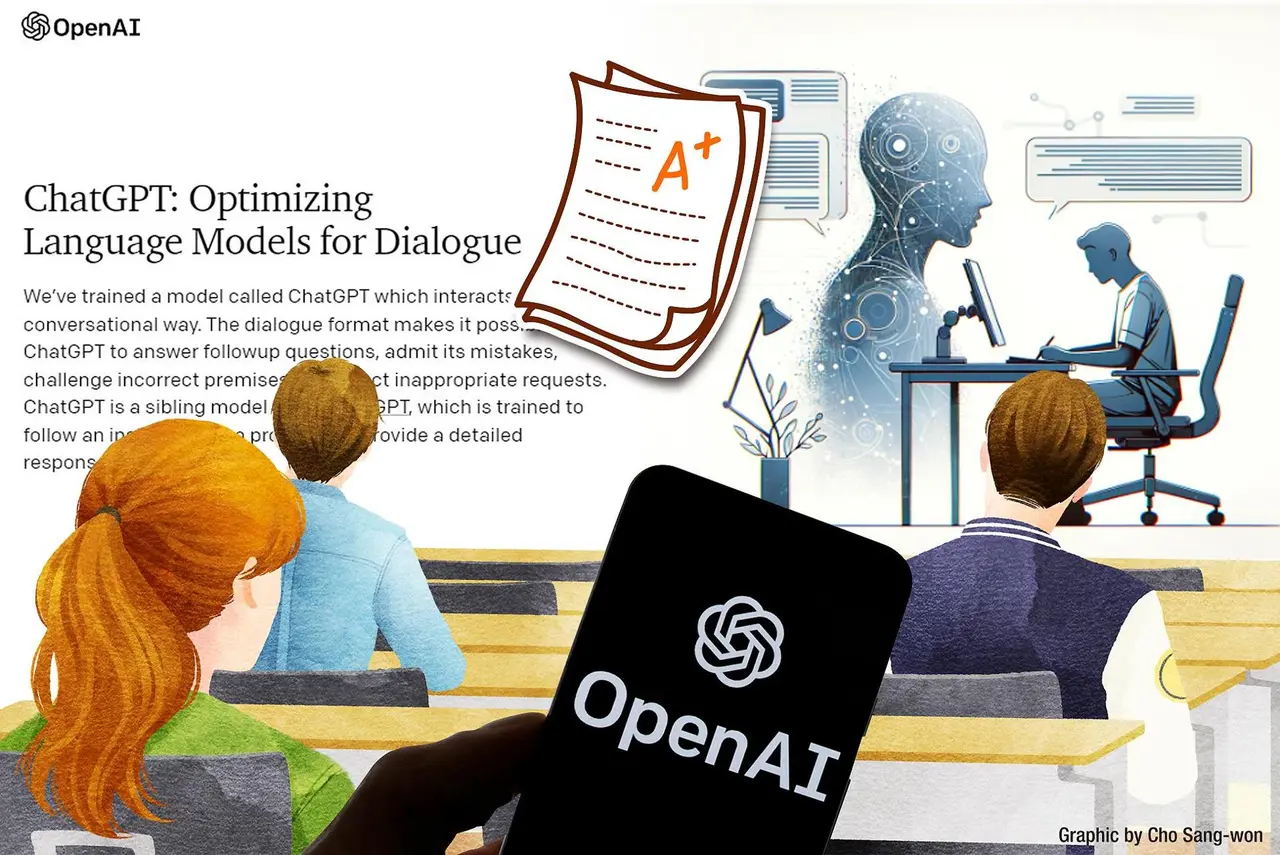Columbia University Student Suspended for Creating AI Tool to Cheat in Tech Job Interviews
5 Sources
5 Sources
[1]
Everybody's Gaming the Job Market With AI
A Columbia University student recently shone a light on a disturbing corner of today's job market. Roy Lee, 21, was fed up with the antiquated way that large tech firms were testing job candidates with computer coding riddles you had to memorize, so he created a tool that his peers could use to beat the system. A translucent window shows the latest version of ChatGPT, which the applicant can use to copy and paste code during a test over Zoom. The recruiter can't see any of this when screen sharing. Lee now faces expulsion from Columbia, he tells me, but he's also received multiple job offers from executives at tech firms, impressed with his hacker mindset and chutzpah.
[2]
He Built a Tool to Get Around Big Tech's Recruiting Process, Columbia Kicked Him Out of School
Roy Lee made a tool that used AI to help him pass technical interviews. He says his University has suspended him for using it. Columbia University student Roy Lee says he’s been suspended after he built an AI program that helped him pass the brutal technical interviews for Meta, Facebook, Amazon, and TikTok. “I just got kicked out of Columbia for taking a stand against Leetcode interviews,†Lee said in a March 26 post on LinkedIn. I spoke with Lee earlier this month after his story went viral on social media. Lee is, or was, a sophomore at Columbia who had an eye towards graduating in 2026. As a computer science whiz, he was all set to matriculate into the world of big tech and land a job for a FAANG (Facebook, Amazon, Apple, Netflix, and Google) company. He just needed to pass the technical interview. The tech interview, or “Leetcode†interview is a grueling process where a job candidate is forced into a lengthy and tedious coding test, often while an employee at the company watches. The technical interview usually involves problems the programmer will never face on the job. To hear Lee tell it, practicing for the tests broke him. So he built a simple tool that takes screenshots of his screen during a technical test and asks an AI system to solve the problems for him. He said it worked and he got offers from multiple tech companies. He started selling subscriptions to his software, dubbed Interview Coder, and put up a video on YouTube of him using it to pass Amazon’s technical test. Then someone tattled to Columbia. Lee shared a copy of the letter that the University shared with him. The name of the sender is redacted, but they claim to be an Amazon employee who was upset when they saw Lee’s video on YouTube. Amazon declined to comment on Lee specifically and Columbia wouldn’t comment on the story, saying that the Family Educational Rights and Privacy Act prevented them from doing so. “I leaked the letter, and it went super viral on X. That single moment probably protected me more than anything else,†Lee said on LinkedIn. When I spoke with him earlier this month, his disciplinary hearing was days away. He shrugged it off, saying he wouldn’t be in the country and was planning to leave the university. According to his LinkedIn post, he appeared in some capacity. “At the hearing, Columbia forced me into a weird admission that the tool could be used to help students cheat in a Columbia CS class. (It can’t.) and put me on academic probation, scheduling another hearing for leaking all the documents,†he said. “A week and a half later, and I'm completely kicked out from school. LOL!†A copy of the complaint Lee shared with me earlier this month came from Columbia. It had a big watermark overlaid on it that said “Not Distribute.†He had posted this picture on social media as well. Lee also shared copies of notes from his disciplinary hearing on LinkedIn and X. “The hearing officers reviewed the evidence presented and observed that you published documents from your disciplinary record, including correspondence from Student Conduct, case files, a photo, and video recording of your Dean’s Discipline Hearing on February 12, 2025, to the online social media network,†the documents Lee posted said. “Due to the nature of the violation(s), you are suspended from Columbia College effective immediately and eligible to return after May 20, 2026.†Lee is selling subs to the software that got him into so much trouble for $60 a month. Every battle with Columbia raises his profile just a little more. “It's funny now and an amazing story in hindsight, but the truth is I was tweaking bad throughout this entire process,†he said on LinkedIn. “Taking this much risk tested my mental strength to its absolute limit, but I'm super glad I did it.â€
[3]
Kicked out of Columbia, this student doesn't plan to stop trolling big tech with AI
Chungin "Roy" Lee, 21, has been using social media to document the consequences of using AI to cheat on his internship interviews.Courtesy Roy Lee A computer science student at Columbia University said he has been kicked out by the school after he built an artificial intelligence tool to cheat in tech job interviews and documented the fallout online. Chungin "Roy" Lee, a second-year undergraduate, garnered online attention after he claimed to have fooled four of the world's biggest companies using Interview Coder, a desktop app he created to discreetly solve technical coding questions. In a now-removed YouTube video, Lee 21, recorded himself using the tool during an internship interview with Amazon. His app, which he said took only four days to build, allows users to take screenshots of problems without being detected by their browsers. It then processes the images using AI to spit out solutions in real time. It was a stunt that highlighted the proliferation of generative AI technology in everything from schoolwork to technical jobs, as users discover new tools to help them cover for their lack of skill or knowledge or to otherwise enhance their abilities. As such tools advance, schools and workplaces have struggled to accurately detect their use."I think 99% people probably haven't realized how far-reaching this could be," Lee told NBC News. "In the past, you could have built an invisible desktop assistant, and you also could have used LLMs [large language models] to solve problems. But now that people are putting the two together, I think no form of online assessment is safe." Lee, who is in New York City, said he got the internship offer from Amazon this year. In February, he went online to broadcast that he "used AI to pass my Amazon Interview." (The video got about 100,000 views before YouTube removed it, citing a copyright claim by Amazon.) Lee claims he used Interview Coder to nab offers from all four of the companies he tested it on: Amazon, Capital One, Meta and TikTok. He said that he rejected Amazon's offer and that several of the other companies rescinded their offers after he publicly posted about his use of AI. As a result of his publicized stunt, Columbia University ushered Lee through a disciplinary process that resulted in a yearlong suspension, he said. A spokesperson for the university declined to comment on individual students, citing Family Educational Rights and Privacy Act regulations. Margaret Callahan, a spokesperson for Amazon, said that while the company welcomes candidates' sharing their experiences working with generative AI tools when it's relevant to the roles they're applying for, they must also acknowledge that they won't use unauthorized tools -- such as generative AI technology -- to help them during the interview or assessment process. Capital One, Meta and TikTok didn't respond to requests for comment. Since he began documenting his journey on social media roughly a month ago, Lee said, Interview Coder has had user growth of 50% week over week, and it's now making $170,000 in monthly subscriptions. He has continued building his brand online as a combative rule breaker by posting what he claims to be emails with recruiters and documents from his subsequent disciplinary process with Columbia. He has gained more than 43,000 new followers on X, where he has seen the most support for his stunt. On LinkedIn, where he has also gained about new 11,000 followers, the reactions have been more mixed, with some users calling his product "morally unethical" or "corrupt." Lee said he's "not really worried about burning bridges" within the academic and corporate worlds at the start of his career, as he prefers to invest in entrepreneurship. Trolling the companies, he said, was an act of protest against what he perceives as their overreliance on LeetCode, a popular online platform that provides preparatory questions for coding interviews. "I was in the top 2% of global LeetCode users, and this was probably, like, the 600 most miserable hours of my life when programming," Lee said. "The questions are not indicative of what you do in the real world. They're riddles that you have to memorize." Other AI-powered interview cheating apps, such as Leetcode Wizard, which touts successful results for thousands of users, have also become increasingly popular during the generative AI boom of recent years. Some of them specifically tap into what many software engineers have expressed as a growing disillusionment with LeetCode. LeetCode "doesn't properly allow engineers to demonstrate their abilities when it comes to programming, while also ignoring the use of AI in daily programming work," Isabel de Vries, Leetcode Wizard's head of marketing, said in a statement. "It's understandable that candidates would want to use similar tools during their interviews." Lee said he knew posting his Amazon interview would be a "really visual, viral way" to tackle the issue that motivated him to create Interview Coder in the first place. He said success would mean getting big tech companies to change their interview formats. Now that tools like his are rising in use and popularity, the genie can't be put back in the bottle. "I think cheating on these online assessment interviews is really much more common than people think," Lee said. "Many CS students who are pretty serious about recruiting and stuff know that there are apps like this. It's just not understood at a large scale."
[4]
He Made an AI Tool to Help With Coding Interviews. Then Columbia University Suspended Him
Lee told Business Insider this week, before learning of his suspension, that his business was tracking toward $2 million in yearly revenues. He had seemingly made no effort to hide what he was doing, and reportedly shared a video of himself using the AI tool during an interview with Amazon last year. After that, someone reported him to his university and he was subject to a disciplinary process. Technically, Lee was suspended for a year not for selling his tool, but for publicly sharing a recording of a hearing and other documents relating to his disciplinary process, which violated an agreement Lee made with the university. Business Insider said Lee had checked the university's policies before making and marketing his tool, and had verified it couldn't be used by students to cheat on in-class work, though it did offer an AI boost that applicants used to cheat on job interviews. Using AI for coder job interviews is contentious. They're intended as tests of applicants' technical abilities, to help verify that they can actually deliver the skills they promise on their resumes. This issue is doubly important in light of a troubling Microsoft report recently showed that many young coders don't actually understand the inner workings of the code they produce, because of an overreliance on using AI tools to help them write the code in the first place. That coding job applicants may be using a tool like Lee's to land themselves lucrative development work only highlights the depth of the problem companies now face when they try to recruit this type of talent. But, as the Washington Post points out, it's not just coders who are using AI as a kind of job application "cheat code." In fact "many" people seeking work employ a host of different AI tools to help them game the system, from AI software that actually "generates application materials" like cover letters to assistants that can help someone "bluff" their way through interviews and systems that can apply to "hundreds of jobs in minutes."
[5]
Ivy League university suspends student who developed AI tool for cheating in tech job interviews - VnExpress International
Columbia University has suspended Chungin 'Roy' Lee, who created an AI tool used for cheating in job interviews with tech companies. Lee, a 21-year-old computer science student at Columbia, an Ivy League University in New York, shared the school's suspension letter on Wednesday via his LinkedIn page. He was suspended for one year for "publishing unauthorized documents" following a disciplinary hearing related to Interview Coder, an app he developed, as reported by Business Insider. This AI-powered tool, released by Lee late last year, can generate code solutions, improve them, and even provide detailed explanations during virtual interviews. Lee said it was undetectable by popular video conferencing apps like Zoom and Google Meet and was resistant to webcam monitoring. He even showcased its effectiveness by uploading a now-removed YouTube video in which he successfully passed a coding interview with Amazon using the tool. He currently sells access to the tool for US$60 per month. He claims his startup is on track to reach $1 million in annual recurring revenue. Lee suggested his AI tool highlights vulnerabilities in current recruitment methods, potentially forcing companies to reconsider their interview practices to ensure fairness and accuracy. "Everyone programs nowadays with the help of AI," he told CNBC. "It doesn't make sense to have an interview format that assumes you don't have the use of AI." Over the last year, experts have noted that AI-powered cheating tools have become so advanced that they are now nearly undetectable. In response, several tech companies are rethinking their hiring processes. Google, for instance, is considering a return to in-person interviews. Studio.init has done the same after discovering that more than half of its candidates used AI to cheat in a recruitment round.
Share
Share
Copy Link
A Columbia University student developed an AI tool to bypass technical interviews for big tech companies, leading to his suspension and sparking debate about AI's role in job recruitment.

Columbia Student Develops AI Tool for Job Interview Cheating
Chungin "Roy" Lee, a 21-year-old computer science student at Columbia University, has been suspended after creating an AI-powered tool called Interview Coder, designed to help applicants cheat during technical interviews for major tech companies
1
. The incident has sparked a debate about the use of AI in job recruitment and the effectiveness of current interview practices.The AI Tool and Its Impact
Interview Coder, which Lee claims took only four days to build, allows users to discreetly take screenshots of coding problems during virtual interviews. The tool then processes these images using AI to provide real-time solutions
2
. Lee demonstrated the tool's effectiveness by recording himself using it during an internship interview with Amazon, a video that garnered significant attention before being removed due to copyright claims3
.Consequences and Controversy
Lee's actions led to multiple job offers from tech firms impressed by his "hacker mindset," but also resulted in his suspension from Columbia University
4
. The university's decision came after Lee publicly shared documents related to his disciplinary process, violating an agreement with the institution5
.Related Stories
Broader Implications for Tech Recruitment
The incident has highlighted the growing use of AI tools in job applications across various industries. From generating application materials to assisting in interview responses, AI is increasingly being employed to "game the system"
5
. This trend raises questions about the effectiveness of current recruitment methods, particularly in the tech industry.Industry Response and Future Considerations
In light of these developments, some tech companies are reconsidering their hiring processes. Google, for instance, is contemplating a return to in-person interviews, while Studio.init has already made this shift after discovering widespread AI use in their recruitment rounds
3
.Lee argues that his tool exposes vulnerabilities in current recruitment practices, potentially forcing companies to adapt their interview methods to ensure fairness and accuracy in the AI era. "Everyone programs nowadays with the help of AI," Lee stated. "It doesn't make sense to have an interview format that assumes you don't have the use of AI"
3
.As AI continues to advance, the challenge of detecting its use in job applications and interviews grows more complex. This situation underscores the need for a reevaluation of traditional assessment methods in tech recruitment and raises important questions about the role of AI in the modern workplace.
References
Summarized by
Navi
[1]
[2]
Related Stories
Controversial AI Startup Cluely Raises $5.3M to 'Cheat on Everything'
22 Apr 2025•Technology

University Lecturer's Drastic Measure Against Suspected AI Use Sparks Controversy
30 Aug 2025•Technology

AI Cheating Scandals Rock South Korea's Elite Universities, Sparking Educational Reform Debate
11 Nov 2025•Policy and Regulation

Recent Highlights
1
ByteDance's Seedance 2.0 AI video generator triggers copyright infringement battle with Hollywood
Policy and Regulation

2
Demis Hassabis predicts AGI in 5-8 years, sees new golden era transforming medicine and science
Technology

3
Nvidia and Meta forge massive chip deal as computing power demands reshape AI infrastructure
Technology





